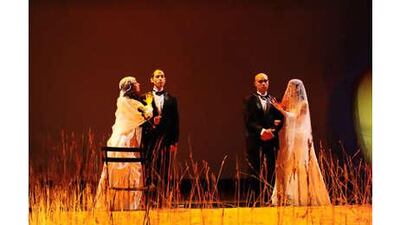"Theatre makers in this region are special," says the Lebanese filmmaker and director Lucien Bourjeily. "No one here is in this profession by mistake. Either they really love it, or they can't do it." Bourjeily, who won a Best Director award in Beirut for his 2008 debut Taht el Aaricha (Under the Vine Tree), isn't just talking about his local scene. He's at a discussion at London's Institute of Contemporary Arts (ICA) about the emergence of a vibrant new attitude to theatre across the Arabic-speaking world. And alongside the Royal Shakespeare Company's Deborah Shaw, Shaza Kandakji of the British Council Syria, and the Tunisian director Lotfi Achour, he's singing the praises of fresh work coming out of the Middle East and North Africa.
The talk is part of the London International Festival of Theatre (LIFT), which has just begun its four-year focus on the Arab world with a UK premiere of the Tunisian play Hobb Story, directed by Achour, and of Aftermath, which was pieced together by the New York Theatre Workshop from the testimonies of Iraqi refugees living in Jordan. Both plays give a vividly human perspective on crucial contemporary issues: Hobb Story addresses relationships and the status of women in Lebanon, and Aftermath looks at the impact of the war on Iraqi civilians.
"This is just a toe in the water," says Mark Ball, who curated the festival. Next year he expects that around a quarter of the work showcased as part of LIFT will be from Arab countries, and he anticipates "spending a lot more time in the region" over the next couple of years. He gives two reasons for choosing the focus: firstly, "a groundswell of exciting new work being made by independent theatre makers" in the area; and secondly, the region's current geopolitical importance. "It's incumbent upon organisations such as LIFT to try to deepen people's understanding of what's going on in that part of the world," he says. "There's such widespread misunderstanding."
Shaw, who co-founded the Baghdad-based Iraqi Theatre Company and programmed a pan-Arab version of Richard III for the Royal Shakespeare Company's Complete Works Festival, agrees on both points. "Because so many of those countries have such big proportions of the population under 30, it's a really interesting moment," she says. Hobb Story's cast and crew were mostly in their mid-to-late 20s, and their mixture of documentary filming, animation, live performance and song, along with their daring subject matter, ensured a young, engaged audience. When the play premiered in Tunis, it sold out at the National Theatre with an audience overwhelmingly under 30; and there was even a queue of hundreds outside who couldn't manage to grab a ticket.
Viewers have been vocal on Facebook in support of Hobb Story's openness in dealing with controversial topics, (the production's English-language Facebook page has 2,587 fans, although a page called "Anti-Hobb Story" has rallied 179 detractors). "Probably the most subversive aspect, says director Achour, "is actors actually saying things as they are. We are from a culture that never says things out loud as they are - when we do say things, they are veiled in metaphor."
"Hobb Story was very eye-opening," says Kandakji," who organised a week of Arab dance at this year's International Dance Festival Birmingham and is a consultant to Syria's national opera house. She believes passionately in theatre as a force for social change, despite the increasing popularity of television and film in her home country. "Theatre is even more important than ever," she said at the ICA talk, "because TV hype stops debate; it stops audiences from asking themselves the difficult questions, like who they are, where they belong, and what they want to do. Theatre allows people to ask the difficult questions - it's not just entertainment."
Kandakji cites the Lebanese and Tunisian theatre scenes as two exciting hubs of activity in the Arabic-speaking world, but acknowledges there are many challenges that practitioners face: censorship, social taboos, lack of funding and lack of infrastructure. "We'd like to create opportunities for people to be part of a vibrant international cultural scene," she says, "but exposure is key. People need to travel; they need to see plays in translation. It's never going to be easy."
When Bourjeily says that no one in Lebanon is in this profession by mistake, he's not only paying homage to his colleagues, he's acknowledging the difficulties they face, although he prefers to see them as a challenge. "Why not perform outdoors, why not perform on rooftops, why not make theatre more improvised?" he asks via a recorded video at the ICA talk. This kind of trailblazing work is increasingly drawing the attention of the western world. "In the UK, we are more interested in what's happening out there at the moment," says Shaw, "but it's not just a war zone, it's an absolutely vibrant artistic cultural centre and has been for hundreds, if not thousands, of years. There's a lifetime of discovery there."

